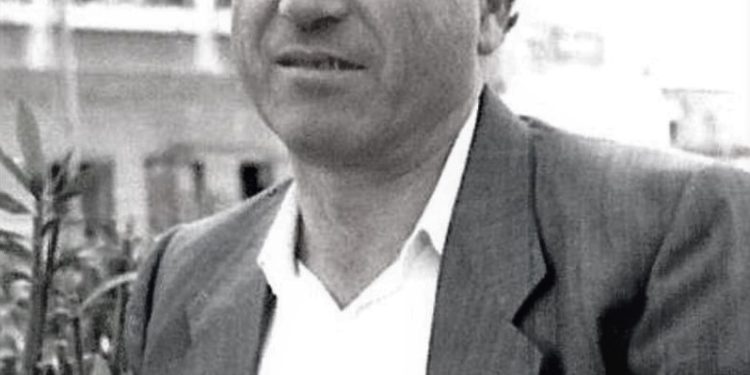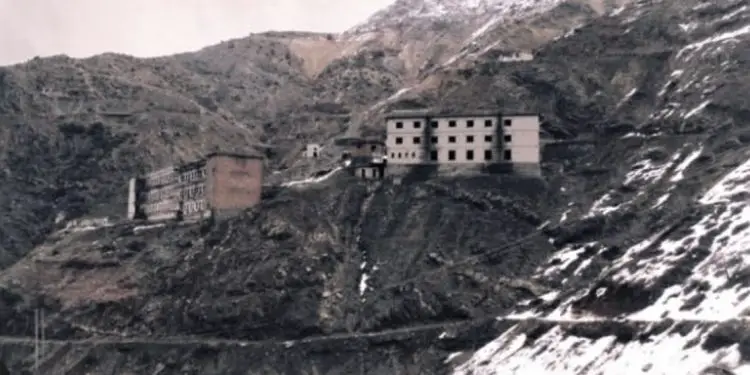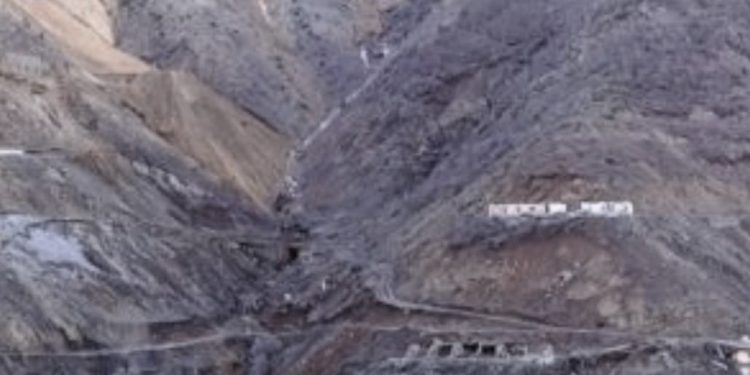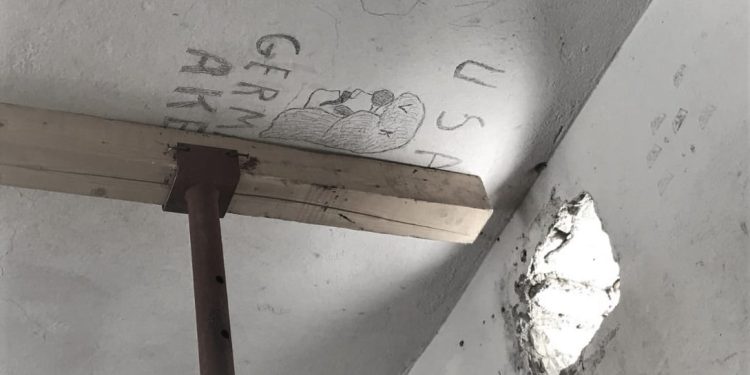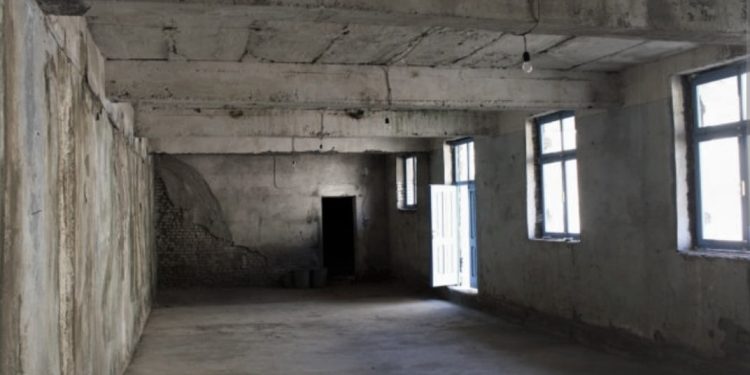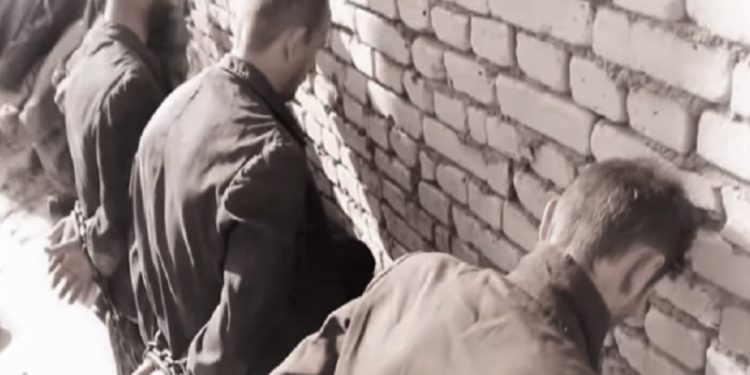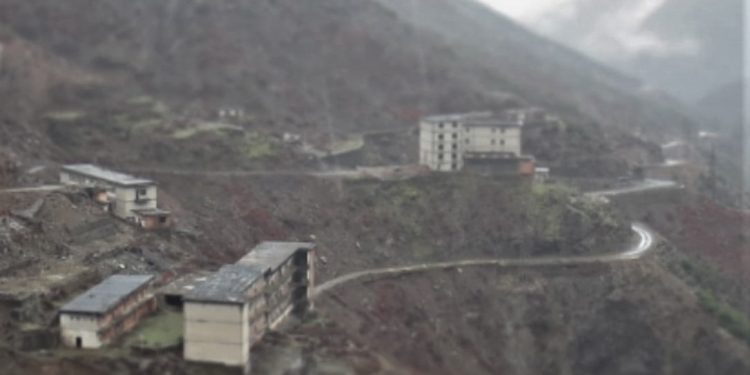By Agim Gani Hamiti
Memorie.al/ Agim Gani Hamiti were born in Vlora in 1947 and he belongs to a family persecuted by the communist regime of Enver Hoxha, since he came to power at the end of 1944. In 1956, when he was still a child, Agimi, together with his family, was interned in the village of Dukat in the district of Vlora. In 1978, he was arrested and sentenced to 14 years of imprisonment, being accused of “hostile activity”. He suffered 10 and half years in the prisons of the communist dictatorship. After 1991, Agimi continued his studies and graduated from the Faculty of Law of the State University of Tirana. He currently lives in France. He published the novel “Odyssey of a detective”
Spaç
“Prison, this abyss of human humility…”!
(Jack London)
Every passer-by who sets foot in Spaç for the first time is automatically overcome by a general apathy, similar to what one feels when one unwittingly becomes a witness to a life in agony. Even if the traveler in question is not alone, entering the great natural well that constitutes this place, he will feel the need for a contemplative silence to delve into the world of his surprised feelings.
From all sides, the country is surrounded by a range of high hills, which, if you look at them from the Spaç pit, due to the very broken relief, create the impression of two ranges in the shape of a semicircle, placed in front of each other. At the two symmetrical points of their meeting, in the southeast and in the northwest, the narrow and deep bed of a stream opens two natural windows of this great river.
The bushes, which partially cover the slopes of the surrounding hills, undergo a severe struggle with nature to survive the wildness of this barren land, in the process of dispersal. Their semi-protruding roots grip tightly, seeping up the sides of charred brown stones or through the cracks of layered tiles. Their leaves can be seen unfolding in the sun for only a few hours, because, as soon as it starts to heat up, they shrink to slow down the evaporation of the water obtained with great difficulty.
In general, the surface of the soil is brown to brown in color and there are layers in the form of breakable plates. Apparently sulfuric acid, quite present in all the running waters of this area, is the main factor in the process of disintegration of the normal surface of the earth. The eye can very rarely catch your eye, only in some stable place, where there may be some piece of earth left, which chance has favored to escape the destructive power of acid.
Even the deep, steep-sided creek bed, which remains almost dry during the summer, bears the color of acidic salts. These phenomena of the unstable structure of the earth’s surface stand out even more because of the pronounced slope of the surrounding slopes.
After having contemplated for a good while this piece of land, a victim of chemical reactions and atmospheric agents, the traveler newly arrived in these parts, in order to clear somewhat the vortex of his troubled feelings, would express his surprise in his own way, usually in accordance with the profession he practices:
If he is a shepherd, he will stutter to himself:
“Here, not even a sheep’s tooth could stick a blade of grass, let alone a cow’s tongue”!
If he is a mason, how if he takes two pieces of stone and smashes them together, seeing how they will crumble at his feet, he will smile in disbelief, muttering:
“You couldn’t put two of these stones on top of each other; you couldn’t put a spoonful of lime with them.”
While a geologist would enthusiastically declare:
“As gloomy as it looks on the outside, it is as gilded on the inside.” He would make this allusion to its copper, which also contains a low percentage of gold.
A specialist in police affairs, seeing this pit as prepared by giant excavators, without thinking long, would say briefly and clearly: “A natural prison”.
The combination of the opinions of the last two specialties that he, apparently, brought to light the terrible government decision, thanks to which, in the spring of 1968, a heavy labor camp was set up in this country, forced to political prisoners.
Thus, after the national soil was about to absorb the sweat and blood of the army of rednecks sacrificed by the communist regime, it was the turn of the underground to seek revenge. New addresses were being added to the long line of infamous forced labor camps of prisons: the ghastly Mine of Spaç and its later sisters.
All these life-sucking addresses were supplied by contingents of political prisoners of the communist regime. With Spaçin, the new wind of underground exploitation of political victims began, whose lives the Directorate of Prison Camps counted in numbers of wagons with ore.
Every beginning is difficult, but the forced labor in the mine, under the conditions of political prisoners, contained in itself a whole system of beginnings that created a mass of difficulties in the progression. From now on they would be forced to work in the complete absence of sunlight and its curative effects on the organism.
The prisoners would now breathe the air from the compressors mixed with a veritable cocktail of gases, fumes, polluted water vapor and the heavy smell of decomposing dead rats and mine rot. During the work of three shifts, tons of diamonds would be burnt continuously.
The constant smoke of the carbide lamps would make its modest contribution to polluting the total air that the prisoners would inhale at their work fronts. The heavy smell of this air made people vomit when they first entered the medieval mine of Spaçi. The lungs of the prisoners, inhaling from this air, surrendered one of their mucous membranes in the rude struggle for a torturous existence in the name of hope.
At the pyrite working fronts, where the temperature fluctuated between 35-40 degrees Celsius and underground sources of water with a high percentage of sulfuric acid dripped constantly onto the naked bodies of the prisoners, who could not stand the heat. By piercing the skin, the acid created such wounds that it turned into torture for the prisoners, undressing and dressing at work and in the bedroom.
In general, the state of working conditions corresponded to a medieval level. The very high forced rate that was demanded of the prisoners daily or nightly by the unsparing police force meant that the conditions of technical security appeared only on paper, marked as a formality by the free person. The prisoners could never work within the stipulated conditions of life insurance, not even in those cases when only a few hours had passed since they had brought dead people from the work fronts.
The material base, which served to create more normal working conditions (rails, plates, winches, boards, etc.) was taken to other sectors, where free workers worked, while the large shortages that were deliberately created in Spaç were “filled” by the police.
In this entire macabre environment, the prisoner cost less than anything, and he paid all the compensations, as the always defeated party in an unbridled war that barbarically took force over the right.
The police had been selected with a special study. All the persons in uniform were the most characteristic embodiment of the virginal ignorance and chronic hunger of these wild and primitive fireflies.
Saving them from extreme co-operative misery, the uniform had provided them with free annual food and clothing, salaries they had never dared to imagine, the privilege of family housing in the nearest industrial town, and preferred workplaces for their wives. .
In the near future, their children would be offered a state scholarship to study, as their father served in an “especially important” job. Complacent beyond all expectations, they initially lived as if in a dream, after they had escaped from corn bread with rations and always without food. And when they were told that people with zero shaven heads and washed-out brown uniforms are enemies of the power in power, according to the code of self-interest, this statement was decoded by their barren minds like this:
“They want to take away from their hands the well-being that was provided to them by the power they wanted to overthrow…”!
And then they became so aggressive that the intervention of a prison command officer was definitely needed to curb their volcanic “patriotism”. The lure of material interest had absorbed them spiritually into the gears of the blind oppressive machine of the state.
The many factors that influenced the general deterioration of the condition of the prisoners, intertwining with each other, strengthened and became even more threatening. The mine’s entrances, like gaping mouths of ravenous canines, absorbed the three 24-hour work shifts.
The vapors they exhaled in nature from their hot bellies gave the impression that the live prey they had swallowed and squirmed through their gills forced them to release excess energy.
The first numbers of tons of ore also brought the first victims, the number of which was constantly increasing. Although those people were innocently sentenced to years in prison, no one was responsible for re-sentencing them to death without a trial. Victims’ families were prohibited by law from dragging the bodies of their dead relatives inside the barbed wire. As long as they had been convicted without committing any crime, their sentence should be commuted.
In the records, which motivated the accidental deaths in the mine, the same expression had taken root: “He had an accident because he did not follow the rules of technical safety at work”. When any prisoner dared to demand the application of the rules of technical security on any work front of obvious danger, the errant police rushed upon him shouting:
“Why do you call the power of the people so foolish that it provides for its enemies”?
Many were those who fell asleep in the humid galleries, from the exhausting fatigue of the late night hours, caught a severe cold and ended up in a hopeless state. Others mutilated themselves, in those circumstances where health served as an intensification of evil, just so they could escape from hard forced labor, for years and years.
This painful history, written with the blood of its victims, would become so threatening that even the subjugation of the high Albanian brand could not withstand without the outbreak of a mass revolt of political prisoners.
It was the first time that the protest against the oppressive and humiliating regime was expressed loudly and publicly in May 1973. The price with which it was paid was very expensive. Four shot and 86 young people sentenced to a total of 1400 years in prison (14 centuries of human life!).
Violence beyond all human conception broke out upon the prisoners, who were forced to submit to a whole system of manifold tortures. But, for sure, the ’73 revolt of Spaci is the most special in the history of mankind in terms of its victims sentenced by the death court.
In addition to the four executed, there was also a hanging on the rope. A military court sentenced the noble “Tarti”, the faithful friend of the prisoners, the dog, which they had raised themselves, to be hanged. The prisoners had found a small puppy and, with joint care, raised “Tart” healthy and quite communicative.
However, over time, this dog, loyal to those who fed it and petted it, began to show an “anti-class” phenomenon. While he was quite approachable and sociable in any brown paint uniform, “Tarti” became more and more aggressive in the green uniforms of the camp police. The latter had begun to be seriously disturbed by the suspicious behavior of this dog.
They had tried twice to settle accounts with him, trying to poison him. The prisoners, and with them the condemned doctor of the camp, did their best to save the faithful dog’s life. Thanks to his powerful organism and the unsparing care of the prisoners, the latter managed to save the dog’s life twice. The third was the truth. This time the police were all-powerful and could easily get rid of a prisoner (as had happened) and no longer one of their dogs.
And on one of the last days of May, 1973, a group of policemen, in whose demeanor and common character you could never find so much nobility as in a congratulatory gesture from Tart, just as even in the most desperate barks of Tart you could find so much ferocity that only in the call: “in line”, of one of them, this group of policemen hung the desolate “Tarti”, who even at the last moment when they threw the noose, did not let them go returned to the green uniforms, biting Capt. Nduen who held himself as a dog specialist.
In the fatal moments of giving up his soul, “Tart’s” paws were writhing in the air as if they wanted to grab the policemen, who hated him so much. He, to the surprise of the latter, did not ask, but, squinting his eyes, let out a muffled growl that proved more menace and contempt than fear.
Surprised by the strange behavior of the dog in this fatal minute for him, Captain Prenga expressed again the suspicion he had shown about “Tart”, when he was caressing the brown uniforms and threatening the green ones: “I told him, oh, this is a dog agent, enters the camp on purpose”.
This time the police did not laugh at these words, because “Tarti” was surprising them more with the manner of his death than with his qualities in life. In these creatures raised in the deepest recesses of the Mirdita highlands, the instinct of communication with animals was more developed than the primitive habits of civilization.
Precisely for this reason, they managed to understand “Tarti” for the first and last time in their lives, exactly at this sublime moment. Bringing the animal on the rope was a message of protest and contempt for the world around him, in which human barbarism executed, in the name of the law, animal nobility. Memorie.al




